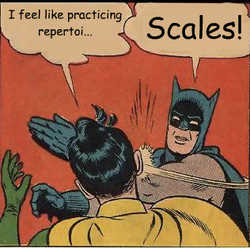
Sadly, scales turn out to be the bane of most students existence. Scale knowledge is used to gauge every audition in the academic musical world. A colleague of ours, a local middle school band director, good old boy type put it succinctly when he said: "Scales is music." This statement may not be grammatically correct, however it is a salient and thoughtful point. His words stick with me to this day.
Most, if not all music uses scales and arpeggios as its building blocks. Thorough knowledge of all major, minor, modal, chromatic, blues, whole tone and diminished scales is very important to the progress of the student (and the teacher!).
At my first semester freshman jury exam at Arizona State University, I was asked to play the B major scale. For the life of me, I could not remember the key signature. In a panic, I played the Bb major scale. Interestingly enough, not one of the six faculty member committee looked up or gave comment. Disgusted with myself (and the faculty), I went to a practice room immediately and spent several maniacal hours on scales. I learned them upside downs and backwards. I have never forgotten how that day changed my musicianship.
All-State is a prime example of the importance of scale knowledge. Almost half of all possible points are dedicated to the chromatic scale, the major scales and arpeggios. The students who make the All-State ensembles must be able to perform all them well, at a reasonable tempo, with a good tone and a sense of musicality. That is the key to becoming competitive at the All-State level.
Bill
Most, if not all music uses scales and arpeggios as its building blocks. Thorough knowledge of all major, minor, modal, chromatic, blues, whole tone and diminished scales is very important to the progress of the student (and the teacher!).
At my first semester freshman jury exam at Arizona State University, I was asked to play the B major scale. For the life of me, I could not remember the key signature. In a panic, I played the Bb major scale. Interestingly enough, not one of the six faculty member committee looked up or gave comment. Disgusted with myself (and the faculty), I went to a practice room immediately and spent several maniacal hours on scales. I learned them upside downs and backwards. I have never forgotten how that day changed my musicianship.
All-State is a prime example of the importance of scale knowledge. Almost half of all possible points are dedicated to the chromatic scale, the major scales and arpeggios. The students who make the All-State ensembles must be able to perform all them well, at a reasonable tempo, with a good tone and a sense of musicality. That is the key to becoming competitive at the All-State level.
Bill
 RSS Feed
RSS Feed
